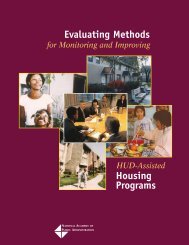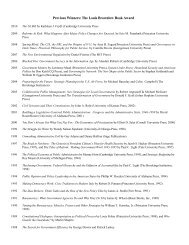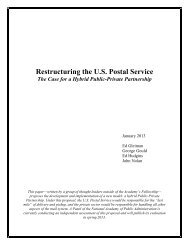High-Performance Partnerships - National Academy of Public ...
High-Performance Partnerships - National Academy of Public ...
High-Performance Partnerships - National Academy of Public ...
You also want an ePaper? Increase the reach of your titles
YUMPU automatically turns print PDFs into web optimized ePapers that Google loves.
PARTNERSHIP CASE STUDIES<br />
chapter three<br />
NEIGHBORHOOD BASED SERVICE DELIVERY<br />
DES MOINES, IOWA<br />
With a population <strong>of</strong> nearly 200,000, Des<br />
Moines, Iowa has a council-manager form <strong>of</strong><br />
government. In 1999, City Manager Eric<br />
Anderson identified the need to bring City<br />
Hall closer to the citizens, understanding that<br />
not all neighborhoods have the same service<br />
priorities. Distressed or transitional neighborhoods<br />
need especially close resident-city interaction<br />
to break the cycle <strong>of</strong> deterioration. As a<br />
result, public safety and code enforcement are<br />
high priorities in these areas. <strong>Public</strong> works,<br />
utilities, and recreational park services also are<br />
important, but the precise mix <strong>of</strong> services<br />
should be tailored to each neighborhood.<br />
Drawing on its strong history <strong>of</strong> neighborhood<br />
planning and grassroots advocacy, Des Moines<br />
established the Neighborhood Based Service<br />
Delivery initiative (NBSD) to revitalize its distressed<br />
and transitional neighborhoods. A<br />
partnership between residents and the city,<br />
NBSD addresses the most critical service needs<br />
within individual areas. Five neighborhoods<br />
were initially designated as NBSD locations.<br />
The program has grown to 16 neighborhoods<br />
in eight NBSD service areas. Designation is<br />
based on whether neighborhoods have a<br />
neighborhood plan, are classified as distressed<br />
or negatively transitional, and have demonstrated<br />
leadership.<br />
Partnership Characteristics<br />
NBSD’s purposes are to enhance the working<br />
relationship between residents and city government<br />
and to resolve key issues that contribute<br />
to neighborhood distress. NBSD teams—<br />
which include residents, nonpr<strong>of</strong>it and business<br />
representatives, and city staff—identify<br />
issues, establish priorities, and implement<br />
solutions collaboratively. They meet monthly.<br />
NBSD partners have distinct yet overlapping<br />
roles. The neighborhood association and city<br />
jointly identify service needs and implement<br />
solutions. The association’s primary responsibility<br />
is to establish service priorities and provide<br />
resident and business outreach. The city’s<br />
main role is to staff the initiative. Police and<br />
code enforcement departments provide fulltime<br />
staff, and other city agencies give<br />
resources as needed. The city has the legal<br />
framework within which many solutions<br />
occur, including criminal prosecutions and<br />
code violations.<br />
Des Moines implemented NBSD by redirecting<br />
existing city personnel and resources. The only<br />
major new expense was for special vehicles to<br />
provide visibility in each neighborhood.<br />
Results<br />
Neighborhood Based Service Delivery is founded<br />
on the principle that the City <strong>of</strong> Des Moines and<br />
residents partner to solve neighborhood issues.<br />
Problem solving must be a joint effort.<br />
NBSD has a very clear mission: to revitalize distressed<br />
and transitional neighborhoods by creating<br />
a citizen-city partnership to identify and<br />
resolve issues at the neighborhood le. The initiative<br />
did not establish specific objectives or<br />
quantifiable performance targets, but positive<br />
citizen response is a testament to its success.<br />
Neighborhood associations periodically evaluate<br />
the initiative through informal assessments.<br />
One concrete measure <strong>of</strong> NBSD’s success is that<br />
other neighborhoods expressly ask to join it.<br />
54 Powering the Future: <strong>High</strong>-<strong>Performance</strong> <strong>Partnerships</strong>









